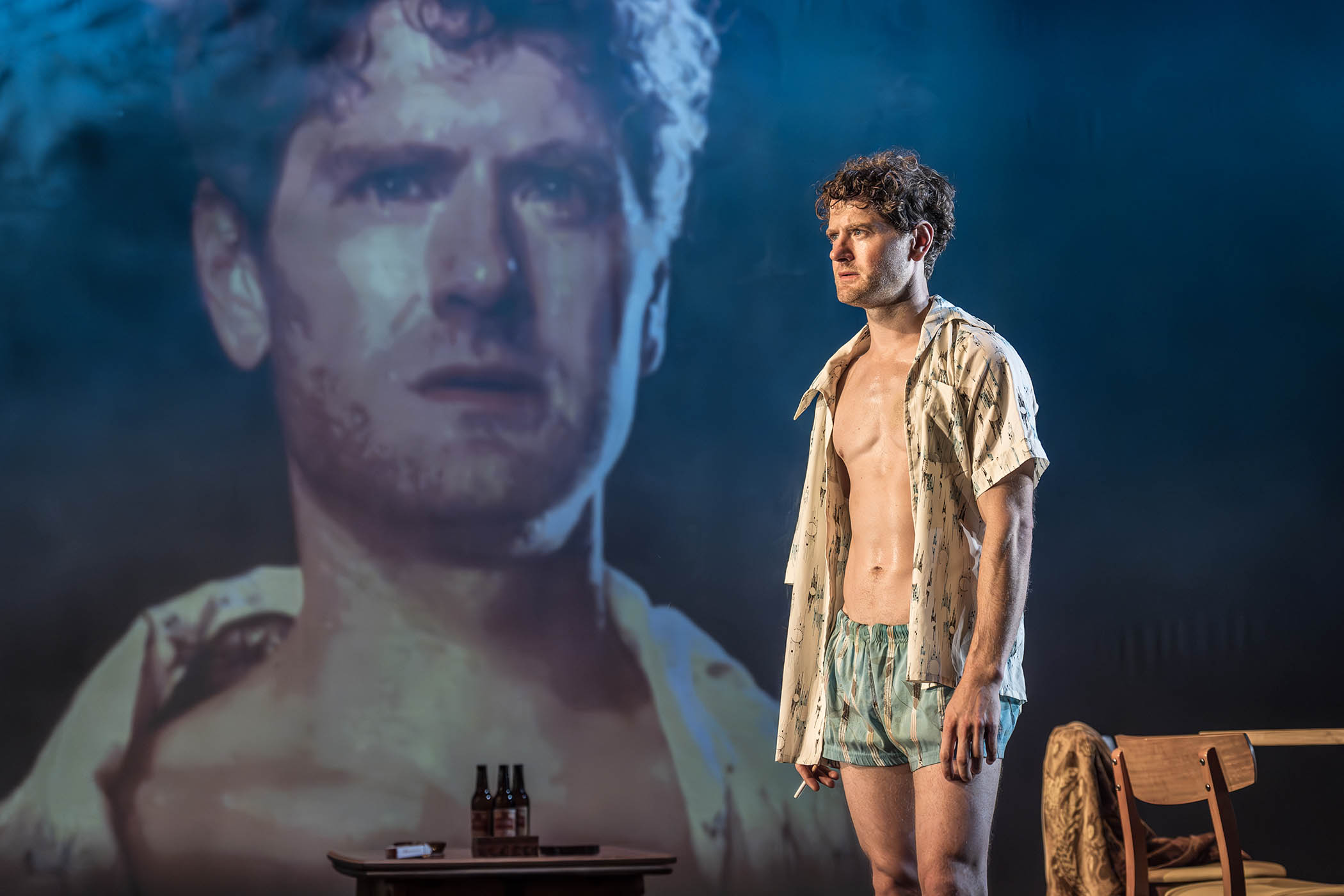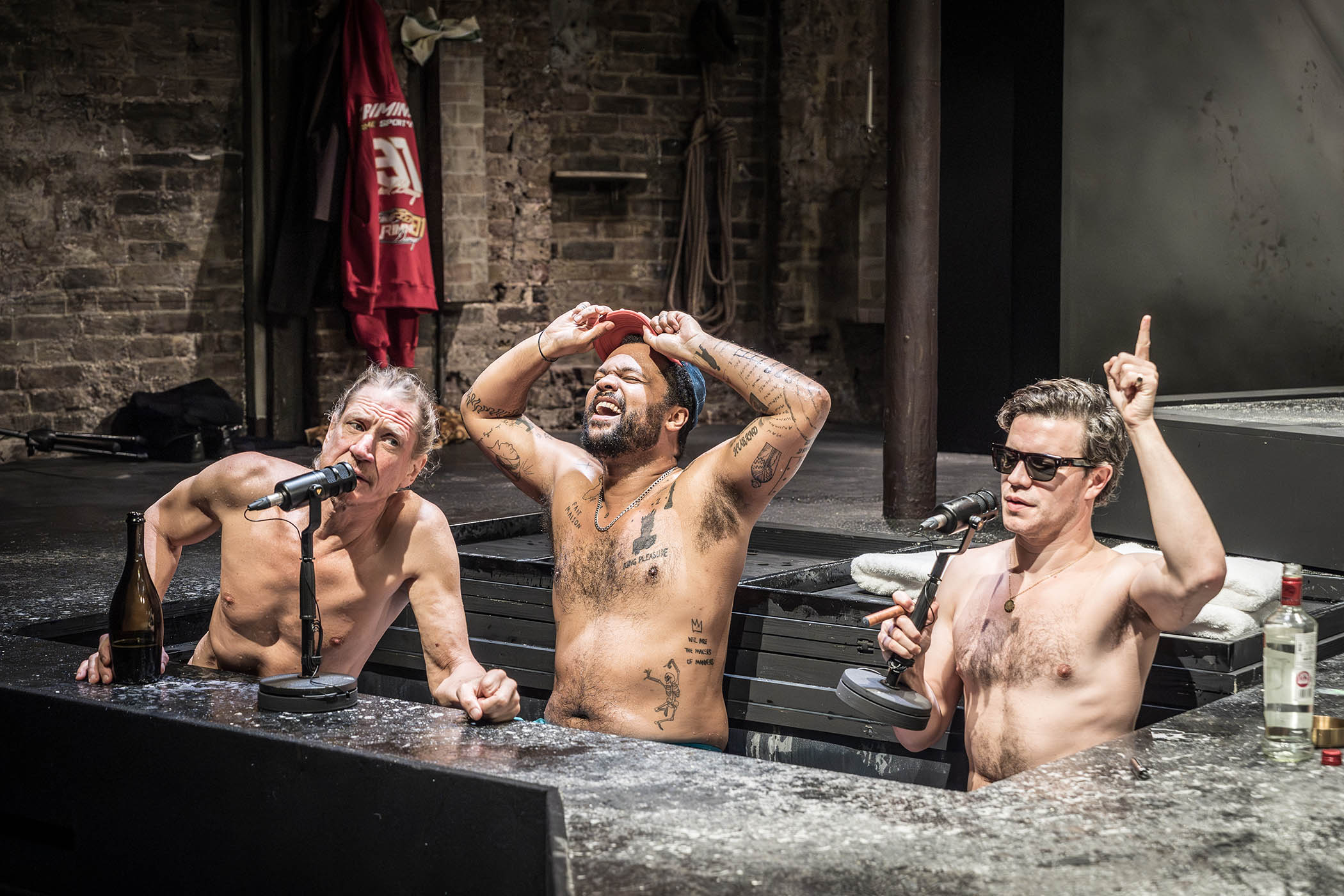Not for the first time, I have been left baffled by the actions of men. For here is one crawling around on all fours pretending to be a badger, while another – a different kind of predatory omnivore – orders the pappardelle at a small-plates place. And here is another, to the left of the stage, chatting to bros on a rightwing podcast before proclaiming: “You’ve got to get into dick health, guys,” at a hot tub party. Which is weird enough; only, in the previous act, he was fighting in the first world war, then heading to the Amazon rainforest to mine for gold instead of validation. But then, men wear different guises, and many of them are showcased here in Alice Birch’s bold, bewildering exploration of masculinity: a fraternal saga that strides – with the mad fearlessness of an intrepid adventurer – across a period of more than 100 years.
Birch has said she had long wanted to write about this subject, as if forgetting that, with Sally Rooney, she has already realised one of the more sensitive portraits of evolving manhood in recent years: Normal People’s Connell Waldron. (Birch, whose screenwriting credits include Lady Macbeth and Succession, was nominated for an Emmy for her work adapting the book for TV.) Like the silver chain around his neck, Waldron (Paul Mescal) was delicate, admired, understated. He struggled with self-expression while inspiring a national conversation – how should a young man be? – as a living, breathing character study.
In Romans: A Novel, Birch presents less a study in character than in taxonomy; man as type, genre, as literary trope: what kind of men are these? Gone is the wordless intimacy; everything is articulated, intellectual, abundant – a wide-ranging quest for self-knowledge. But man is not a concept or category: for all the play’s roles and ideas, it lacks an emphasis on individuality.
There is a logic underlying this clever, confounding mess: the challenge is identifying it. Explicitly, the play is built – in its ambitious, inventive form – around the two subjects of the title Romans: A Novel. It is both a history of the Romans, the surname of three brothers, and of the novel form, from the 19th century to postmodernism. Men evolve, via Hemingway’s mountaineers and Lawrence’s bourgeois beasts, from soldier to small plates in one domesticating swoop. There are forceful gearshifts in tone and style, so that the second act feels like a second play, yet the script clings to the notion of continuity: the way identity is formed through inheritance and history, a sequence of actions, a cursus honorum.

Olivier Award winner Kyle Soller is precise and efficient as Jack Roman
Another way the self is shaped is through storytelling, since every man has a story, and for a long while, every story seemed to be a man’s. For Jack Roman (Olivier Award winner Kyle Soller, precise, efficient), it begins like this: a boy, roused by his uncle’s tales of war, is packed off to boarding school after the death of his mother in childbirth.
As in Birch’s Anatomy of a Suicide, trauma is a tripwire; we watch, flinching in our seats, as Jack and his brother Marlow (Oliver Johnstone) are brutalised by the cane; they escape this violence towards a nobler suffering on the battlefield, then in mountain ranges, jungles and at sea. Marlow has walked straight off Conrad’s pages. Their younger brother, Edmund (a captivating Stuart Thompson, all sweetness and sympathy), is listless, wandering; he is a gay man in the early 1900s, which, by his account, means he is not much of a man at all (hence, the therapeutic role-playing as an animal later on).
There is so much communication, so many voices, it is hard to know to whom we should listen
There is so much communication, so many voices, it is hard to know to whom we should listen
Through lighting changes, an otherwise static backdrop helps guide us from place to place: a spray of branches becomes a spray of blood; a plume of smoke after shellfire becomes a cloud of snow then the grey London smog. It is here that Marlow arrives to build his fortune and Jack to write literature: the latter becomes a modernist author, marries a brilliant woman called Clarissa (Dalloway? Harlowe?), squashes her and sends her to a sanatorium, where she stares at yellow wallpaper. In an incongruous, unnecessary scene, presumably set in the 1960s, he becomes a cult leader, who silences dissent with LSD.
The three brothers, Lehman Trilogy-style, start by narrating their histories to the audience directly and chronologically; under Sam Pritchard’s fluid direction, they seamlessly roam through the decades on a constantly revolving stage. By the end, their narrative is fragmented, freewheeling. Throughout, they speak themselves into being, their main concern being how a man might make something of himself, or rather, of the self – that elusive idea of a thing. Marlow is a “self-made” man; Edmund declares he “has not the pieces” to make himself the same. Jack, for all his man-of-action heroics, makes a life out of words, then puts it in a biography; Marlow opts to cement his legacy in the manosphere through podcasting.
The problem is, there is so much communication – so many tales and voices – it is hard to know to whom we should listen. Whose story should we invest in? Birch’s language is blistering and poetic, if occasionally heavy-handed, delivered with great fluency and feeling by a gifted cast. But however tremendously acted, the brothers begin to feel reductive: not real men, nor really human, narrators in search of something to say. We leave Jack in the dark still grappling for meaning; I suspect the audience shares the feeling.
Romans: A Novel is at the Almeida, London, until 11 October
Photograph by Marc Brenner
Newsletters
Choose the newsletters you want to receive
View more
For information about how The Observer protects your data, read our Privacy Policy

